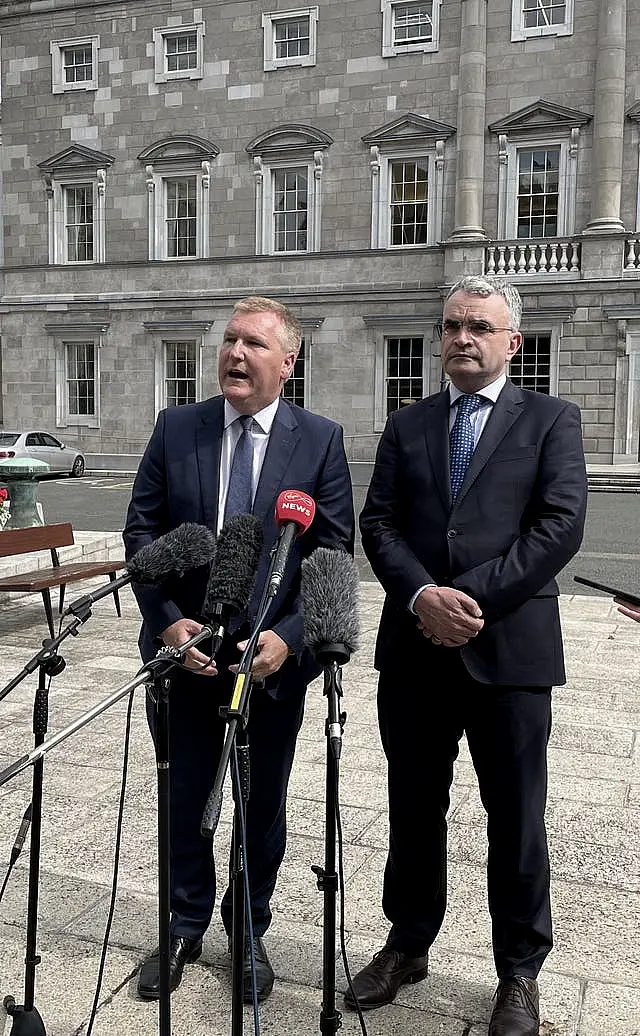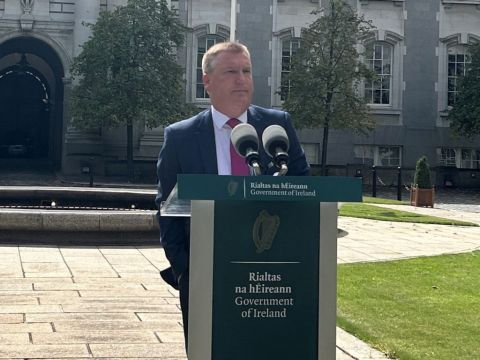Minister for Finance Michael McGrath has said that “a strong economy” enables the Government to invest in public services, as Fianna Fáil looks to put its stamp on the upcoming budget.
While remaining coy on budgetary options, he said it would be a “challenging” autumn and winter for people due to high mortgage repayments and energy bills.
Budget 2024, which will be unveiled on October 10th, will be the first budget a Fianna Fáil Minister of Finance has delivered in more than 10 years – when the country was in the grips of the recession.
Minister of State for Business Dara Calleary, who spoke to reporters alongside Mr McGrath on Tuesday, said the party will work with businesses to put “a Fianna Fail stamp” on Budget 2024.
“We’ll be doing quite a lot of work within our party with groups ahead of the budget to ensure that there’s a good strong Fianna Fáil stamp on this budget and this is part of it,” he said.
Asked what that was, he said it meant ensuring that businesses with an international focus have the support to stay in Ireland, and to ensure that opportunities are evenly spread across the country.

Mr McGrath said the health of the Irish economy was the result of “the innovation, the ingenuity” of the private sector and pro-enterprise policies.
He said it was also the cooperation between the private and public sectors, “underpinned by pro-enterprise policies being pursued by this government and previous governments as well”.
“It has fed into to that success, but we should never take it for granted, because countries all over the world are examining the Irish model and examining Ireland’s success in attracting inward investment, in becoming a country now that is internationally widely recognised as being very supportive of business.”
“We are supportive of the business because of the jobs provides, because of the tax revenues that are generated, which enables us to invest in education, in healthcare, in public infrastructure and critical frontline public services.
“So that is the link which I think speaks to the very heart of what our party recognises: that a strong economy is there to serve society, to serve the public good.”
On budgetary matters, Mr McGrath said although he had previously indicated is that the bank levy will continue into next year “in some form”, he is examining the scope of it, including who should be paying it and how much.
He said that if it is extended to include non-banking sector, that would change the basis of the levy, which would require legislative change.
“We haven’t made any decision at this point in time,” he said.
In relation to a concrete levy of 5 per cent, which will be introduced in September as part of Budget 2023 to fund a remediation scheme for people whose homes were built with defective blocks, Mr McGrath said that he recognised “some of those costs will be passed on to the end consumer”, but said the scheme needed to be in place.

Mr McGrath was also asked about the Revenue Commissioners stating that ready-mix ingredients for pre-cast concrete would be included in the levy, going against a government commitment not to include it.
“So the Revenue Commissioners are interpreting the legislation, as enacted by the Oireachtas, and so the intention of the legislation was that the added value element of recast (concrete) would be exempt, but the ready-mix component is subject to the levy and so that’s the basis of the Revenue’s interpretation.”
Mr McGrath said that the excise relief on petrol and diesel prices will still be lifted as planned as the Oireachtas had legislated for it.
The excise relief was implemented in March last year at a cost of a billion euro up to June this year, and is due to be partially lifted on September 1, rising by 7c for petrol and 5c for diesel.
He added that the final phase of the restoration of the excise is due on October 31, where it will increase by 8c for petrol and 6c for diesel.
“Of course, in the same way that when excise was reduced it took a while for that to feed through to the prices at the forecourts, the same should apply when excise is being increased,” he said.
When asked about one-off measures, he said this would be decided on “what is appropriate for the economy”, but also said it would be “a challenging autumn and winter period for many” due to high energy bills and high mortgage interest rates.

“We don’t want to start pushing inflation back up in any material way. So we have to take all of that into account, but at the same time recognise that a lot of households do remain under real pressure.
“While the announcement by Pinergy yesterday was welcome, it’s only a start and energy prices remain high for many, many households and are likely to through the autumn and winter period.
“Of course for mortgage holders, unless they are protected by a fixed rate, since rates started to go up in July of last year, many of them have seen a very significant increase in their monthly mortgage repayments as well, so we do have to take into account the pressure that people are under.
“We haven’t decided yet the overall quantum and then the mix of measures between universal measures and targeted measures, but there will be (one-off measures),” he said.
He added: “While you have to consider the macroeconomic impact of your spending plans. We are representing people all over Ireland and we will never understate the scale of challenge we face on housing – it is our number one domestic priority as a party and as a government.
“We will always be looking at opportunities to do more. And I do think that capital investment is different in nature to current investment. Current investment, of course is permanent, it’s recurring every single year.
“Capital investment, you can step in and step out and you can move priorities from one area to another and housing is just the greatest priority we have this time.”







